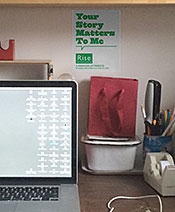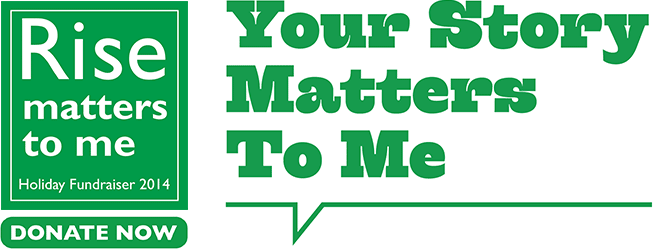
|
|

|
|
Checks must be made out
to our fiscal sponsor:
Fund for the City of New York |
|
Send to: Rise, 112 W. 27th St. #607
New York, NY 10001 |
|

|
|
 |
|
Hang in your office to show your commitment to parents and Rise. |
|
Your support matters!
We rely on individual giving for 20% of our budget. |
|
|
‘As a caseworker or policymaker, you’re not even going to know the issues that need attention unless you hear from parents themselves.’
I work at the NYU Child Study Center as part of a team focused on child trauma, and I’m also a co-chair of the National Child Traumatic Stress Network’s child welfare committee. Rise recently joined us as a member of a subcommittee focused on parents in the child welfare system who have had experiences of trauma. In the past few years, there’s been a shift toward a much better understanding of the impact of trauma on kids. The next step is to understand the impact of trauma on parents. I think that’s starting, but there’s a long way to go.
Right now our subcommittee is developing a series of online training modules to help child welfare professionals better understand the needs of these parents. The first is focused on visitation. We want the training to be as engaging and interactive as possible, so we thought it would be great to integrate the voices of parents themselves. We’re working with Rise to do that.
Rise is a powerful voice for parents in the system and a really important tool. In the child welfare system it can be challenging for people to be honest with each other. For parents, especially, it’s hard to feel safe talking openly because of the fear that what you say will be used against you. Rise is one of the opportunities to hear straight from parents in a way that people in the system don’t often get.
One thing I have heard from parents is that, while their kids are in foster care, they have to focus so much on just getting their kids home and doing what they need to do that they can’t think about their child’s needs. There just isn’t that space for reflection. And, honestly, isn’t it hard for everybody to be attuned to someone else’s experiences while having an intense experience? When you feel unsafe or under pressure, it’s always going to be hard to say, “I really want to understand what this is like for you.”
But there’s a disconnect, because what people in the system want is for parents to show that they understand their kids’ needs. If you’re a caseworker and a parent says to you, “I just can’t think about my child’s feelings right now,” that’s only going to make you mad at them. The Rise stories can help people understand that many parents feel that way. You can start to understand that it’s part of a broader dynamic that the system generates.
Working with parents who are dealing with the child welfare system because of child maltreatment brings up a lot of understandable emotions in staff—frustration, anger, sadness. At the same time, staff need to be compassionate and curious. One of the most challenging things to do is to hold both of these feelings in your head. Understanding trauma—and understanding parents’ stories—doesn’t mean absolving them of any harm to their kids. It means using your knowledge to be able connect and move the family to a better situation.
If we understand common experiences that parents have, we can start to consider different solutions. But as a caseworker or policymaker, you’re not even going to know the issues that need attention unless you hear from parents themselves.
(back to top)
|





